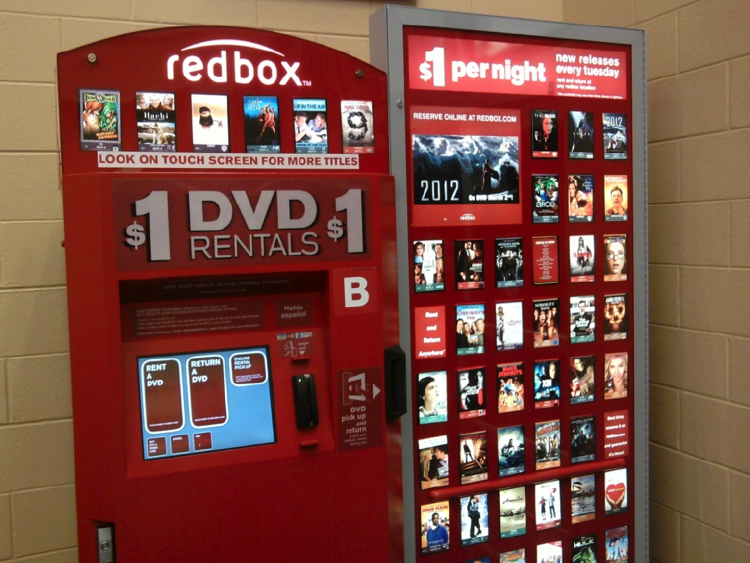That was almost 10 years ago. Disc as it seems was hardly dead then and is still going. Granted, some things have changed since then, my perspective not the least among them, yet I content that disc still has a place in this digital world.
According to DEG (Digital Entertainment Group) the 2014 totals were as follows
- DVD and Blu-ray sales, $6.93 billion
- Subscription Disc rentals, $829.7 million
- Rentals from brick and mortar stores, $696.4 million
- Kiosk Rentals (Redbox etc.), a whopping $1.81 billion
- EST (electronic sell through), $1.55 billion
- Subscription Streaming, $4.01 billion
- VOD (Video On Demand), $1.97 billion
First, let’s get one painfully obvious thing out of the way: “rental”. Yes I would say that the notion of renting a movie on disc is on its way out. We are looking at the end of an era. I am in fact shocked that the above disc rental figures for 2014 are as high as they are, especially the kiosk number. All the BlockBuster Videos in my area are long gone, as are the Jumbo Videos (which was a smaller Canadian chain).
Come to think of it I don’t know where I’d go to rent a disc today except for that “vending machine” thing at the grocery store which may well explain why they are doing a tidy 10-figure business right now. The bottom line is that all the disc rental numbers combined are less than subscription streaming is bringing in right now. Factor in VOD and the disparity is even greater. It may not be over yet, but its close enough to call I think. Disc rental has even gone so far as to sabotage itself as users of Netflix’s rent-by-mail and/or Redbox can testify: often the discs are overloaded with non-skipable trailers and some studios hold titles back several weeks in order to artificially bolster other revenue channels.

Disc rental’s last stand.
Taking its place: digital rental and streaming! If you must see the latest hits and can’t wait for them to show up on your streaming service, you can rent individual titles from services like iTunes or Amazon, some while they are still in theaters (for a significant premium of course).
With a streaming service on the other hand, such as Nexflix’s for example, at a monthly cost of little more than one new release, my wife and I take in piles of almost new releases, not to mention more hours of TV shows than I care to admit.
And while Netflix is the name most associated with streaming video, a host of others are up and coming. South of the 49th you have Hulu which I gather is a big deal, and now the cable providers are getting on the band wagon: In Canada Bell Aliant has their Crave service and Rogers has Shomi. Recently legislation came down forcing them to open up those services to anyone (not just their own TV subscribers).
Secrets Sponsor
Sure there are some who hold out on principal. They’d still rather pop the disc in and get a full 29mbps of Blu-ray goodness. My own brother is one such a champion of audio and video fidelity. Just a few months ago I encouraged him to try Netflix’s streaming service. He obligingly signed up for the free month…and ended up sticking with his rent-by-mail service. A minority? To be certain, and people like him are not what keeps the disc pressing facilities in business.
So with the rental paradigm shifted (almost) completely to digital rental or streaming, what’s keeping disc alive?
Disc purchases!
That almost $7 billion figure cannot be ignored. Yes that number has been on the decline, but it is still more than four times the amount spent on digital purchases. Moreover the EST figure has not increased by an amount reciprocal to disc sales shrinkage. In other words, overall we are spending less on movie purchases in general, but that doesn’t signal the end of disc. On the contrary.
Rather than focus on dollar figures, what we need to do is ask the question “why do people buy movies?” if we want a better perspective on the future of movies-on-disc.
Is it the quality?
As a hardened videophile, cursed with “the gift” of seeing every encoding flaw on screen, I’d like to think it’s a quality thing that’s keeping hard media viable, but while an important consideration, that’s only one slice of pie.
There is no question that a disc, meticulously encoded, will yield a finer presentation compared to the best of the best streamed service. While the mentality is slowly changing, traditionally Hollywood puts the lion’s share of the budget into quality control of the disc release, far less on that of digital delivery. This makes sense as with disc, you have a single encode to worry about.
With digital, every service does their own thing. In disc’s favor is that it is unencumbered by infrastructure, a topic of much consternation. While it’s hard for some people to imagine, not everyone has a 100mbps pipe coming into their home. My own sister, who lives just 20 minutes outside of town, can barely stream a regular 1080 line movie (and at that only if the rest of the house refrains from internet use). Streaming which truly equal Blu-ray is already a challenge (even Netflix’s much lauded high bitrate service falls short) and streaming 4K to a degree which has any sort of market significance is a ways off. If you are buying a movie, for whatever reason, you are always going to get a better product on disc.
Secrets Sponsor
That said, the relative picture and sound quality of digital media streaming has come a long, long way and frankly, if we are being honest here, I can fire up a movie on iTunes in about one fifth the time it takes me to get a Blu-ray going (loading…..then menus….and finally FBI warning crap before the feature can start). Taking Netflix as an example, while they do their own encoding, the deliverable they require of studios is no less than an 80mbps MPEG2 or 422 Prores file. That’s forward thinking and means that as infrastructure improves, so should their produce (in theory at least). For all but the most ardent quality aficionado, streaming is “good enough” from a quality perspective so while many buy discs for the benchmark quality, that alone cannot be what continues to drive disc sales. What else does disc have to offer?
For one, its physical (no pun intended).
It’s simple human nature to want to have in your hand what you paid for. Without a disc on a shelf, you are detached from the purchase, it loses value, and the last thing Hollywood wants is to lower the value of its product.
Consider collecting for a second. I know a lot of people who collect movies on disc do so just for the sake of collecting. Back when DVD was a new thing, one of our own writers had one of the most impressive DVD collections I have ever seen. It topped out at something around 1,000 titles and took up an entire wall of his dining area. All of the important pictures were there, plus many I had never even heard of…yet half were still in the shrink wrap. He hadn’t even watched them!
For him it was all about the assembling of the collection. While TLC would probably have twisted him into an episode of “Hoarders”, more often than not collecting like this is a fun hobby and one Hollywood is more than happy to fuel and one which, frankly, loses all appeal if you have to “log in” to appreciate it.
Lets dig a little deeper though. Why collect movies at all, as oppose to, say, beer bottles from around the world, license plates from across the US, or model trains? All those things mean something to those who collect them but I submit that collecting movies is almost universal. Movies are the literature of the 20th century and anyone who says they haven’t played a role in their life is in denial (or has lived under a rock).
Watching a movie in and of itself is an experience, usually a positive one (unless you get roped into a Michael Bay crap fest). We want to bottle up that experience, put it on a shelf, and take it out again…literally. It is true that with today’s “entertainment on demand” paradigm, it wouldn’t be too hard to find many, though certainly not all, of a person’s movie collection available to them via one or another streaming or download services. Dealing with multiple providers has its downsides though and the catalogues are far from complete. Yet even as they are bound to expand and consolidate, cliché as this sounds, “its just not the same” as having discs on a shelf.
For one, there is an inherent distrust of service providers. In the case of subscription streaming, availability of titles wax and wane: a given movie or TV show can be dropped from the catalogue at a moment’s notice and even if you “buy” movies in the cloud, you are for all eternity dependant on the provider to be in business. While in the short term this seems a ludicrous concern, I know people who have bought movies only to lose access to them when a company fails or the rights change hands. Yes, despite the industry downplaying it, it does happen. There is simply something infinitely more reassuring about having a physical piece of media in your hand.

Sorry honey, I guess we wont be streaming all four Twilight movies tonight… yea, I’m bummed too <cough>.
Lets be clear on something here: whether its music or movies, CDs or Blu-rays, we never actually “buy” the album/movie, only a license to enjoy it. With a DVD or Blu-ray, we have the material in our hands. We don’t own Casablanca, but we own the right to put that disc in and watch Boggie snarl over and over again. Buy a movie in the cloud and you are buying the right to….stream it. Not quite the same in that you are not in complete control.
Sure, on the one hand Apple (or whoever) probably isn’t going anywhere any time soon, but consider that a few years ago, Bruce Willis allegedly pitched a fit when he found out he couldn’t legally will his iTunes library to anyone. Maybe he did maybe he didn’t. Point which that story brought to mind is that when you buy in the cloud not only do you give up any and all possibility of selling or even just LENDING a friend a movie, but you can’t even GIVE the damned thing away! Put that way, having a movie collection in the cloud is not so cool, is it?
Lets push beyond that notion. Even more than the assurance of access, buying and having a physical disc is a statement. As soon as a person buys their very first disc, a precedent is set: If someone has, lets say, the Indiana Jones Trillogy on their shelf, but they feel that Star Wars is at least as significant a franchise, well, they simply have to buy it, otherwise their shelf isn’t telling the right story. Buying/owning a movie is fandom at its purest. Its saying “this movie is good enough”, or “important enough”, or “significant enough” to warrant a disc purchase.
Hollywood knows this and plays right into it. Disc has a lot of value-add to it that streaming, frankly, just doesn’t want to deal with but which ups the ante for disc. The very notion of “extras” is about feeding that fandom. It started with LaserDisc and the very first “commentary tracks” but it really came into its own with DVD: multiple commentary tracks, myriad documentaries, photos, behind the scenes, deleted scenes, marketing materials, and so on. Often there is so much value-add they can’t even list it all on the jacket.
As if that wasn’t enough to satiate the fans, a given movie is released multiple times, with ever increasing prefix crap: Special Edition. Deluxe Edition. Ultimate Edition. On some occasions these iterations were due to technical reasons (does anyone remember “Superbit”?), but for the most part it was, and still is, a successful bid at getting fans excited about the purchase and to connect more deeply with the movie. I remember when Lord of the Rings was first released to DVD: I mused to the clerk at BlockBuster about whether I should buy the Theatrical Edition or wait for the Extended Edition. “Well” he said (and I quote) “a true fan would get both”. Good salesmanship dude!
And just to make things a little more interesting, there is an ever increasing number of titles being released with “stuff” to satisfy those for whom just having a disc doesn’t cut it. Take Die Hard for instance. For a cool $100 not only can you get all five movies, but a plastic Nakatomi Plaza skyscraper to boot. Sounds stupid to me but someone is shelling out. They have to. Their psyche demands it. I lost track of how many editions of BladeRunner they put out (I bought in at the 5-disc Final Cut edition). The last one I saw included a nice photo booklet. If you have one, I’m jealous. And lets not forget the ridiculously cool Argonath bookends which you could have gotten for a few bucks more when The Lord of the Rings Extended Edition DVDs were first put out. If you want a set now they are on ebay for anywhere from $25 to $100. Best of luck if you decide to put in a bid.

You may have “bought” the movies on iTunes, but you know darn well you wish you had this on your shelf.
And for the record, I am among those who simply had to re-buy several of what I feel are important titles, at least to me, on Blu-ray when I already had them on DVD. Why? Because I simply must have them in HD for crying out loud! A by heavens if Danjaq/EON thinks I’m going to shell out another $200 for a future 4K edition of the James Bond movies (Skyfall notwithstanding)…well, they would be right. Credit card in hand, standing by.
In summary, disc wasn’t dead ten years ago, despite dooms day cries to the contrary, and it isn’t going anywhere anytime soon. Disc remains a fundamental piece of the home entertainment paradigm for two complimentary reasons:
– Disc is necessary to push the technical envelope. If disc magically disappeared today there would be precious little incentive for the display technology market to challenge itself. If a highly compressed movie is rife with banding, ringing, and other issues, no one is going to even notice a TV which has slight issues handling color space conversions. Even if it becomes a categorically niche market, disc (or some other yet to be conceived physical media) will always be around to act as a benchmark for everything else.
– Sure, disc sales figures have been shrinking. So what? Did you know drip coffee machine sales were slipping as well (in favor of pod)? No one is crying about the drip machine being dead though (and incidentally sales are back on the rise). Likewise, despite the shrinking dollar figures, disc is far from a vanishing market. Given that the existence of disc is virtually guaranteed by the above mentioned technical point, there will always be a market for it in the myriad of movie fans. They demand something you can hold in your hand which comes in an attractive package, accompanied by a bevy of value-add. Given that the “work” of mastering and encoding a title has to be done either way, the cost of making a title available on disc is almost negligible, and as such Hollywood is always going to be on board.
Christmas is right around the corner. Why not treat yourself to a few of your favorite movies on disc? Your eyes, ears, and ego will thank you.


